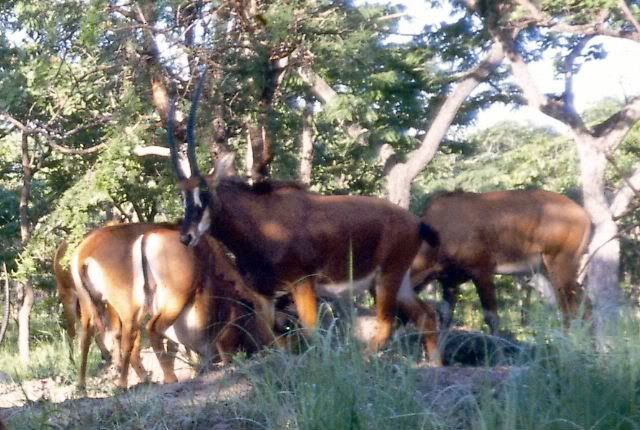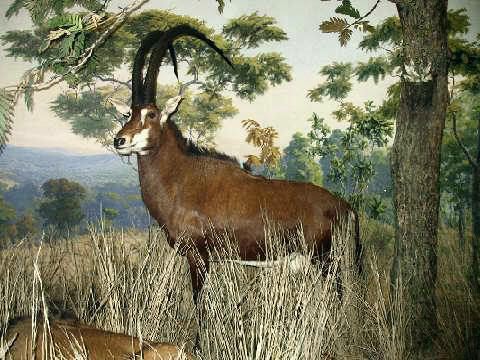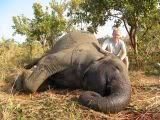

 The Accurate Reloading Forums
The Accurate Reloading Forums  THE ACCURATE RELOADING.COM FORUMS
THE ACCURATE RELOADING.COM FORUMS  Hunting
Hunting  African Big Game Hunting
African Big Game Hunting  Giant Sable in Angola
Giant Sable in AngolaGo  | New  | Find  | Notify  | Tools  | Reply  |  |
| one of us |
You Are Here: FrontPage Local News The Namibian Thursday, March 6, 2008 - Web posted at 6:25:17 GMT Angola's sable antelope survived decades of war ABSALOM SHIGWEDHA ANGOLA still has herds of the rare giant sable antelope (Hippotragus niger varianien), an animal many people assumed had been wiped out in the country's 27-year civil war. The Giant Sable Conservation Project, aimed at the protection of the Palanca Negra, as the antelope is called in Portuguese, has found herds of giant sables in two protected areas of Angola. The project leader, Angolan researcher Pedro Vaz Pinto, on Thursday made a presentation on the status of the Angolan giant sable in Windhoek. Vaz Pinto said the two protected areas in which the giant sable were found are the Cangandala National Park in the northern province of Malanje and in the Luando Reserve. He said in the Luando Nature Reserve the project has so far tracked about 30 animals while between 100 and 200 giant sable have been located in the Luando Nature Reserve. "They only exist in these two areas," said Vaz Pinto. He said the project had been a major success in terms of conservation efforts in Angola, where very little is happening this area. "But this is understandable because the country is still recovering from a long civil war," said Vaz Pinto. The project started in 2003 and uses remote cameras triggered by an infrared beam to search for the animals. The majestic but notoriously skittish beast is regarded as Angola's national animal. The striking curved horns of the adult male, which can grow up to 165 cm long, appear on the logo of the country's national airline and the national football team. Many people assumed that 27 years of civil war had wiped out the species because there had been no confirmed sighting since 1982. Vaz Pinto believes that if the animals managed to survive such a long period of war, he was sure they could continue to thrive. Angolans across the country view the antelope as a mystical, almost sacred creature and this helped it to protect it from poachers, said Vaz Pinto. He warned, however, that rediscovering the Palanca Negra has also brought a host of new challenges, not least putting in place some form of protection for the animal, which could fall victim to agricultural encroachment, unscrupulous breeders or trophy hunters and poachers. Facts Distribution: Endemic to the central highlands of Angola Status: Critically endangered. Habitat: Light woodland, especially in a mix of bush and grassland, with water in the vicinity. Diet: Mostly grass, although they browse on leaves. Social behaviour: Mature males hold a territory, selecting the best grazing to attract females. Breeding: Single calf born at any time of the year, after nine months gestation. | ||
|
| one of us |
Too bad they don't have photos. I've never even seen a photo of one. | |||
|
| one of us |
Mike, It's your lucky day. Here's a pic that was taken with one of the cameras mentioned in the article in about 03 or 04. My friend and neighbour was one of the guys that went up there on the forst or second trip to look for them.........  | |||
|
| one of us |
This one is in the London Natural History museum.  _______________________________  | |||
|
| one of us |
They look more like a giant roan to me. Thanks for the photos. | |||
|
| One of Us |
im glade someone realy came up and spoke about giant sable i have been skaing a lot,just curious if someone hunted recently i mean in 2 decad, pics will b appriciated kind regards ur 3 greatest hunts r ur first ur last and ur next | |||
|
| Powered by Social Strata |
| Please Wait. Your request is being processed... |
|

Visit our on-line store for AR Memorabilia

